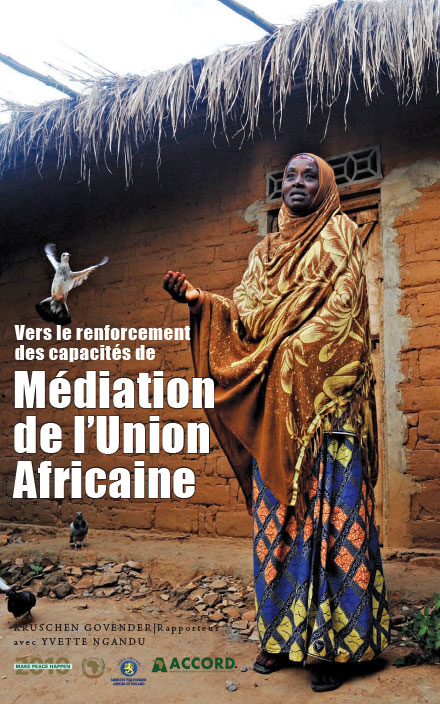
The Towards Enhancing the Capacity of the African Union in Mediation report is based on a seminar organised by the African Union Commission on 15 and 16 October 2009. The seminar and report are part of the ongoing collaboration among a range of actors to strengthen the mediation capacity of the AU.
Armed conflict is one of the greatest threats to Africa’s development. Today, many African countries are in the throes of civil conflict, several more face a heightened risk of experiencing armed violence, while others are recently emerging from protracted wars. The challenges ahead are sobering. The African Union (AU) organised a seminar entitled “Towards Enhancing the Capacity of the African Union in Mediation”, which was held at the Commission of the African Union, in Addis Ababa, Ethiopia on 15 and 16 October 2009. The seminar was the culmination of a series of consultations launched in late 2008, in collaboration with the United Nations (UN) and other stakeholders, to reflect on lessons learned from mediation experiences in Africa. The Addis Ababa seminar brought together policymakers, mediation experts and civil society actors to develop a more strategic approach in enhancing the AU’s mediation capacity. In so doing the participants addressed the following themes:
- Improving the AU’s performance in mediation
- Consolidating and integrating the approaches of the AU and the RECs in mediation
- Discussing collaboration with partners including the UN.
Collaboration between African and international actors is critical for strengthening the AU’s role in conflict prevention and mediation in Africa. International mediation is a long-term process, thus it is necessary for relationships between external and internal actors to be one of equitable partnership, synergy and complementarity. There are a plethora of strategic challenges relating to international peace mediation in deep-rooted conflict. Arguably, it is not possible for the AU to design a generic “mediation strategy”. Mediation practice should be highly flexible, utilising various strategies and responses to the circumstances of each case. Nonetheless, it is possible for the AU to define and adopt a “strategic approach to mediation” – which is based on the principles of the organisation, the experience of peacemaking on the continent and the goal of forging sustainable peace agreements.
The key discussion themes were underpinned by the working paper, “Plan of Action to build the AU’s Mediation Capacity,” prepared by Dr. Laurie Nathan. Most of the working paper themes were mentioned and some critically debated by participants at the Addis Ababa seminar. Different views were expressed, but in general participants affirmed many of Dr. Nathan’s recommendations. A common thread throughout the two-day seminar was the nature of mediation relationships between the AU, UN and RECs – more specifically the sensitive question regarding ‘who takes the lead in mediation?” In addition, other pertinent themes were raised, such as the importance of promoting gender equality and mainstreaming gender in the AU’s mediation framework. Therefore, the “role of women in mediation” and “mediation relationships between the AU, RECs and partners” will be explored further in this report. The outcomes of the seminar were intended to initiate the strengthening of the AU Commission’s Peace and Security Department (PSD) by discussing lessons learned and best practice and by catalysing the process of defining a strategic approach to mediation. The AU and UN are undertaking the first Triennial Review of the 10 Year Capacity-Building programme for the AU. The outcomes of the Addis Ababa seminar should be used to inform the review.
This report provides a succinct contextual framework to capture the essence of the discussions and subsequent recommendations presented at the seminar. In many respects, this report is a follow up to ACCORD’s 2009 research report “Mediating Peace in Africa: Securing Conflict Prevention”, which captures the issues discussed at a seminar held in Addis Ababa, Ethiopia on 4 March 2009. The meeting in March was also organised by ACCORD and the Ministry of Foreign Affairs of Finland, with the participation of the AU. This second report although focused on the October 2009 seminar, therefore also includes excerpts from “Mediating Peace in Africa: Securing Conflict Prevention”, as well as widely referencing Dr. Nathan’s working paper.
Download the French version of the report here.
By:

